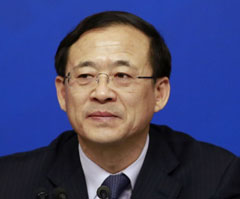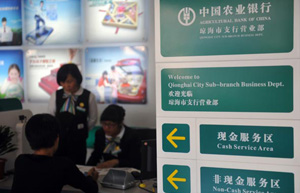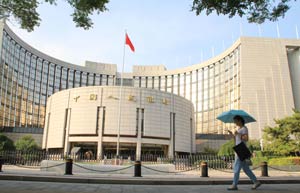Liu Shiyu, a vice-governor of the People's Bank of China, has been appointed as Party secretary of Agricultural Bank of China Ltd, the nation's third-largest lender by assets, media reports said.
|
 |
|
Liu Shiyu, vice-governor of the central bank, is reported to have been appointed as Party secretary of Agricultural Bank of China Ltd. |
The bank, in a regulatory filing to the Shanghai Stock Exchange on Monday, said an interim shareholders' meeting will be held on Dec 5 to elect Liu as the executive director of the board.
The 52-year-old Liu has served as vice-governor of the PBOC since June 2006. Before that, he worked at the office for economic reform restructuring in Shanghai, the former State commission for restructuring the economic system and China Construction Bank Corp from 1987 to 1996.
He holds a gree from the School of Economics and Management of Tsinghua University.
Liu replaced Jiang Chaoliang, 57, who was named as acting vice-governor of northeastern Jilin province after resigning from his position as chairman of ABC on Aug 31.
Guo Tianyong, a professor of finance at the Central University of Finance and Economics, said: "Liu Shiyu is familiar with State-owned commercial banks due to his experience with China Construction Bank. He was also in charge of transforming the wholly State-owned banks into joint-stock companies while he was at the central bank. Agricultural Bank of China will benefit from his appointment, for he will maintain continuity of the bank's reform."
Liu is a crucial executor of the plan for the reform, restructuring and public listing of China's five major State-owned banks, to which PBOC Governor Zhou Xiaochuan contributed strategies and ideas, an unidentified bank executive told Caixin.
The personnel change may precede other management reshuffles in the financial sector as the Communist Party of China's top officials gather in Beijing this week for a key meeting, which started on Monday.
Liu's appointment is an example of the "revolving door", or the movement of personnel between roles as regulators and in the industries affected by the legislation and regulations, said Wu Qing, a financial research fellow with the Development Research Center of the State Council.
During recent discussions on China's financial reforms, some industry insiders supported the revolving door-type personnel system, saying that it gives officials a chance to gain practical experience before they are promoted. Many others, however, objected to this system.
"Experts disapprove of having personnel moving between a regulatory authority and the industry it regulates because that will make regulations less precise and more subject to interpretation," Wu said.
|
 |
 |
| Top 10 richest banks in the world | China's central bank sticks to prudent monetary policy |
